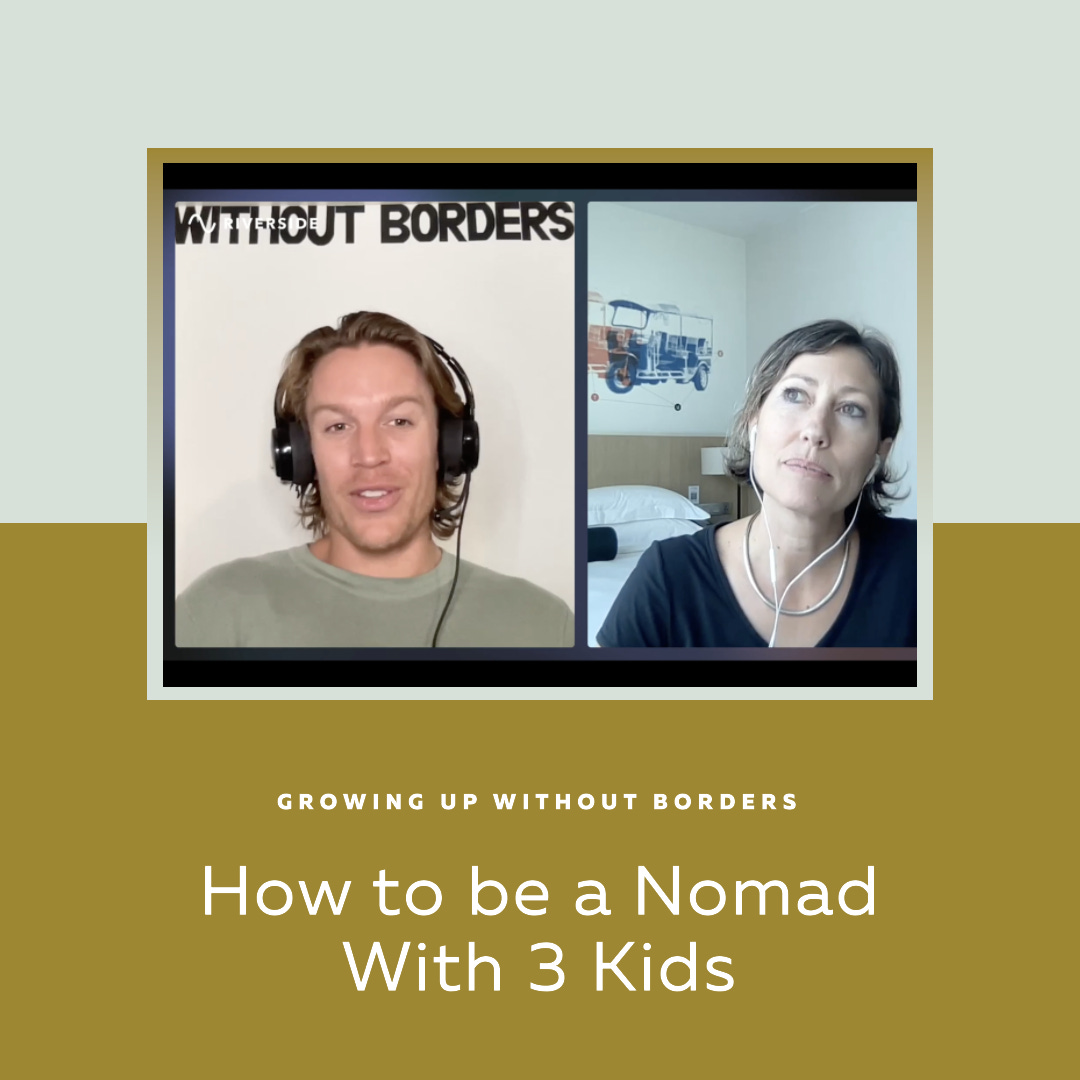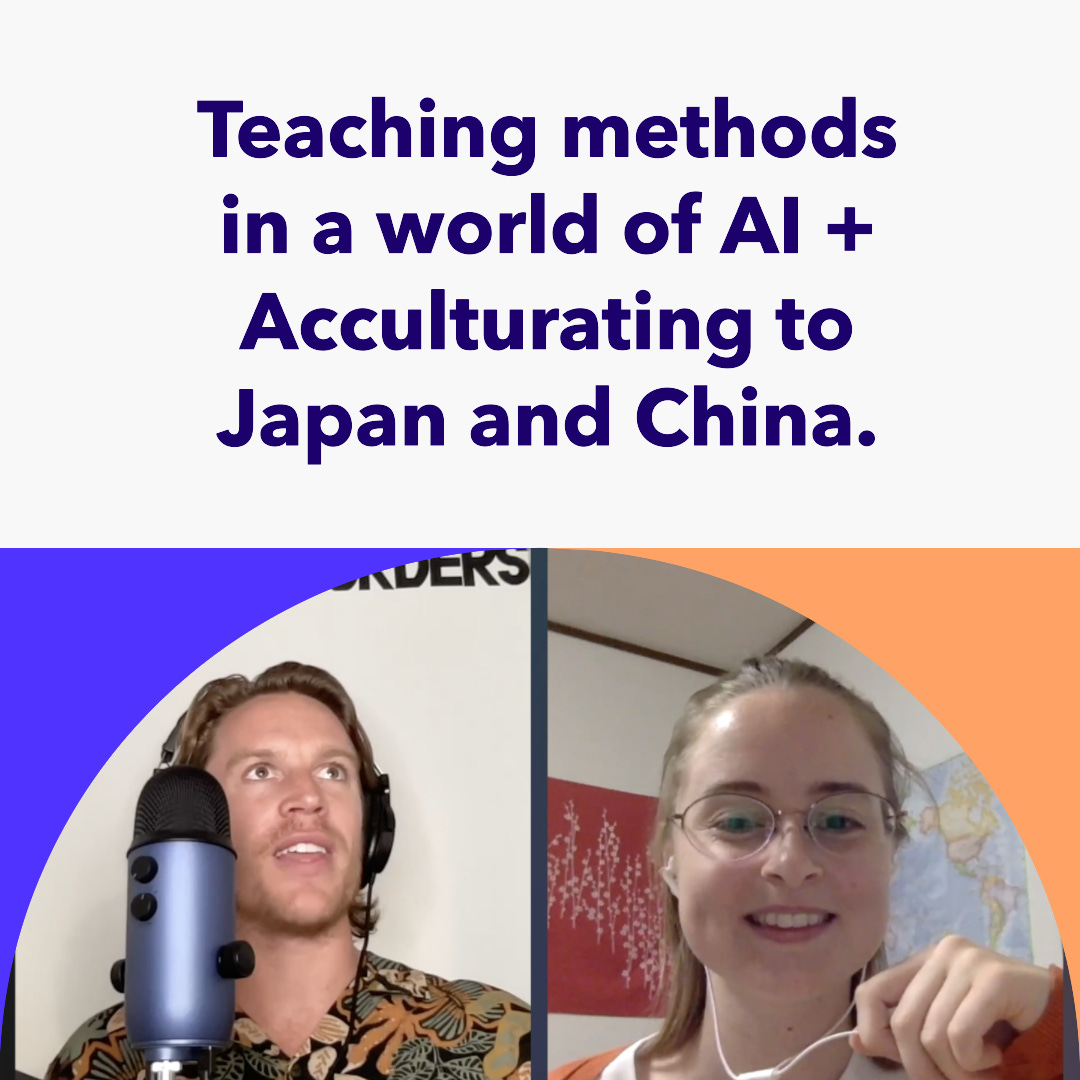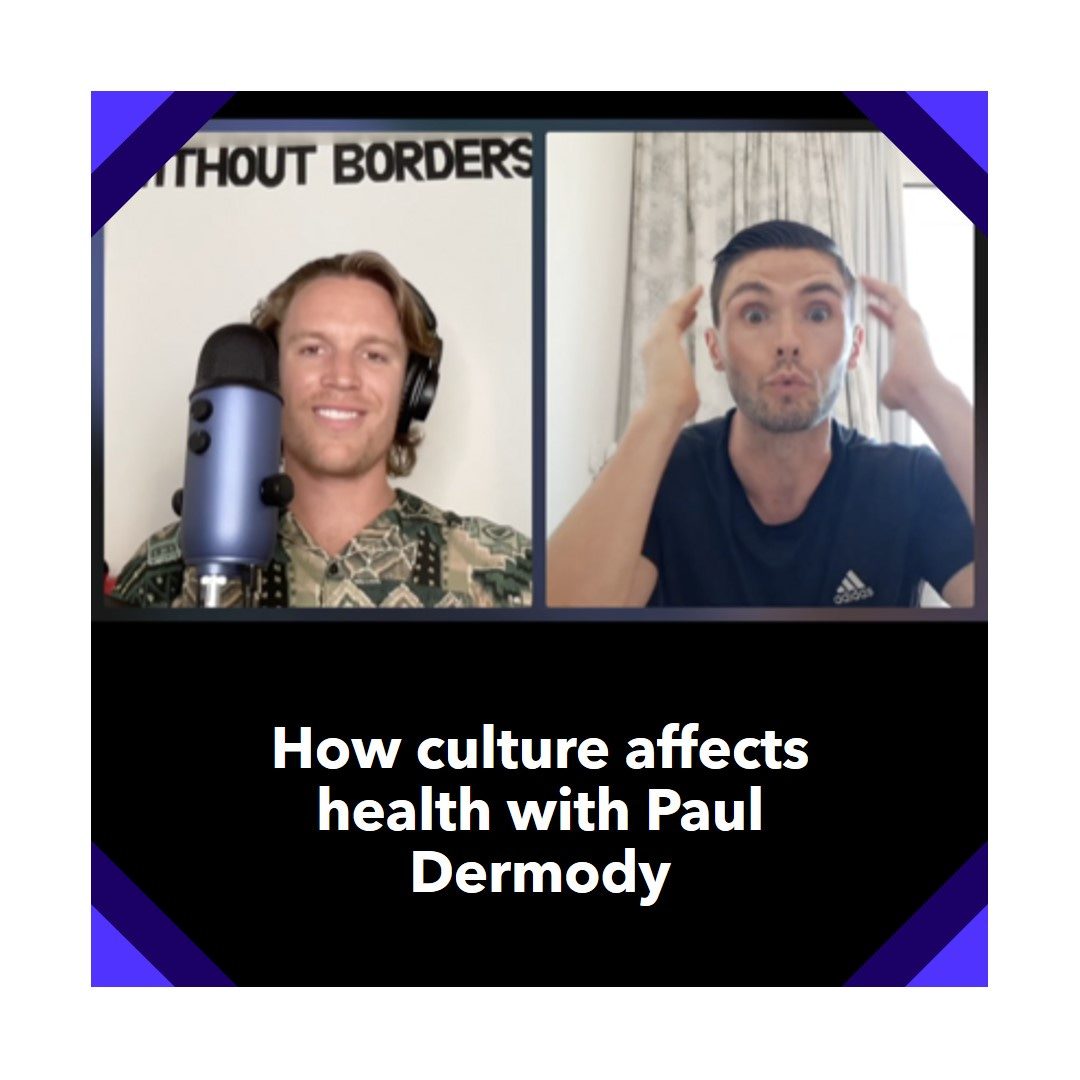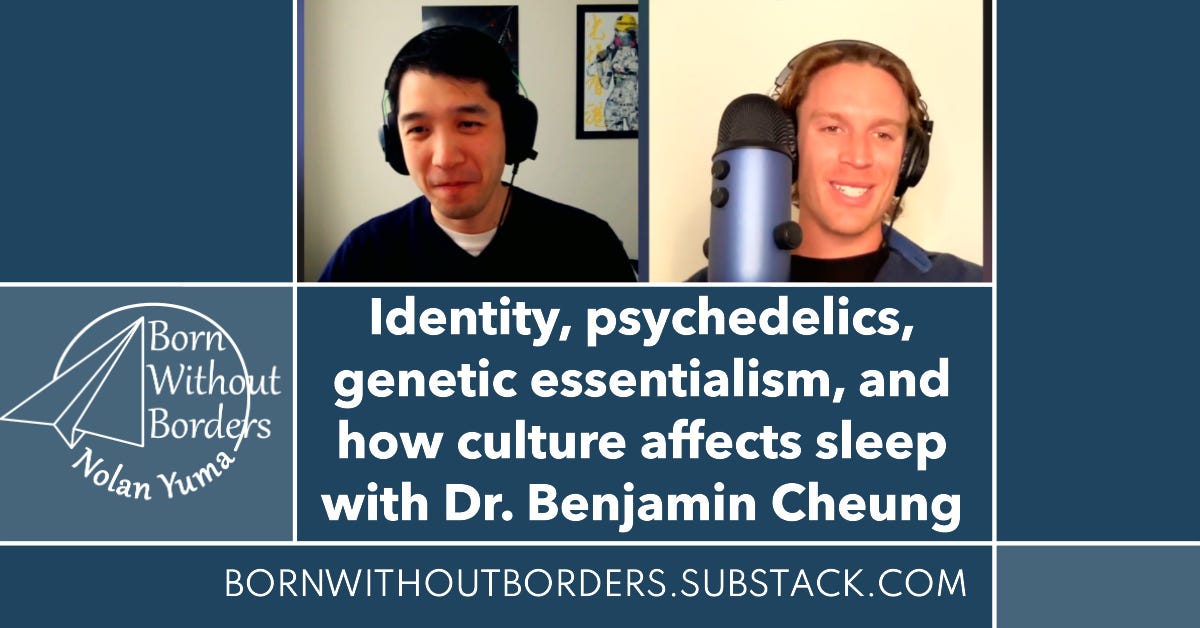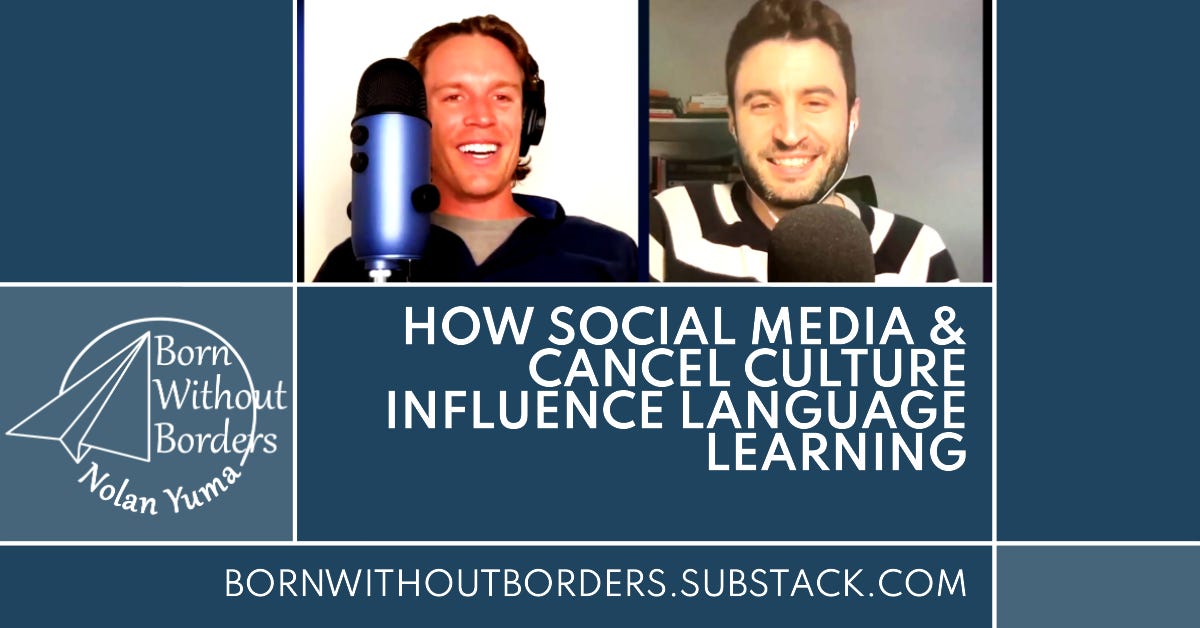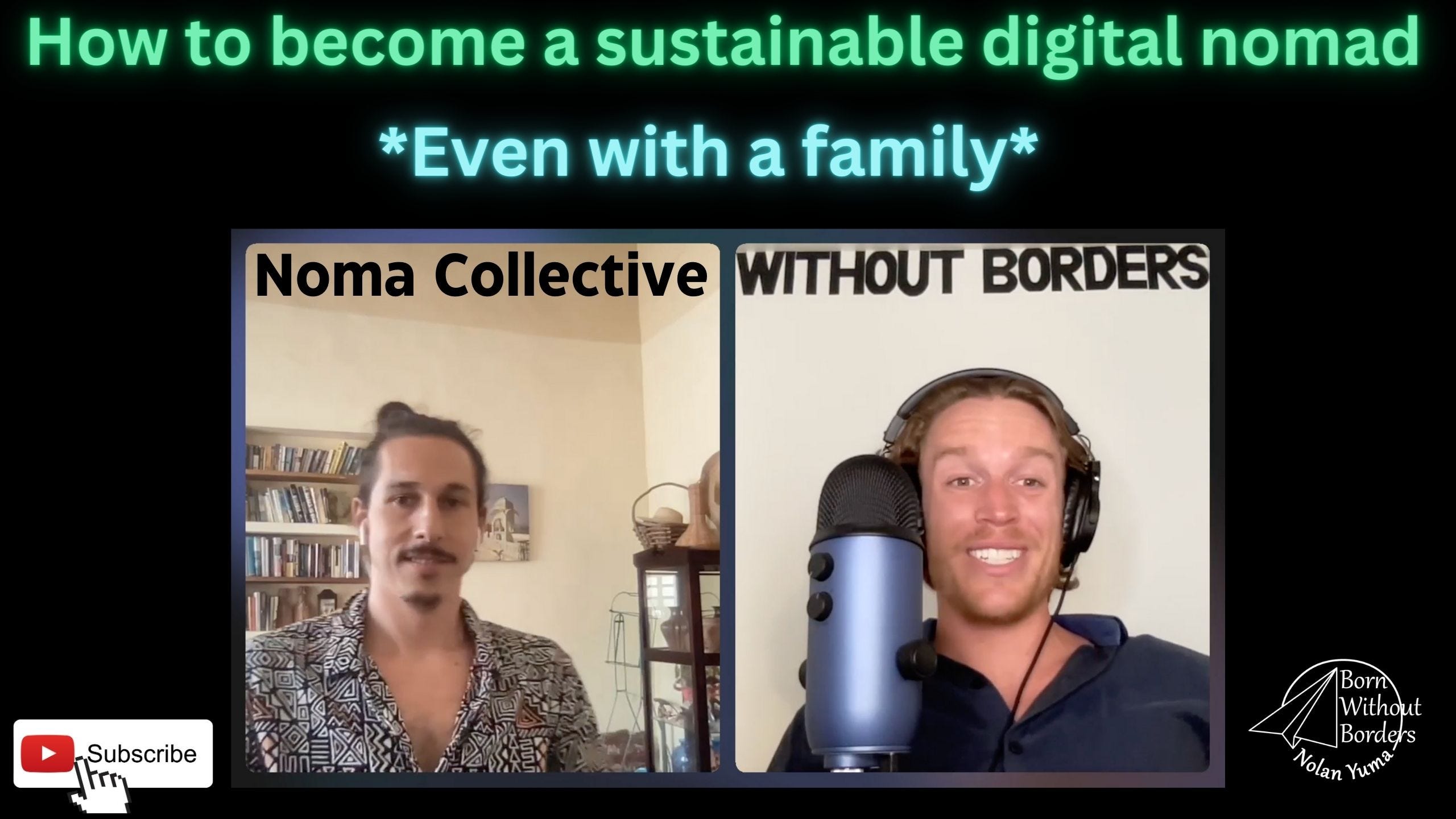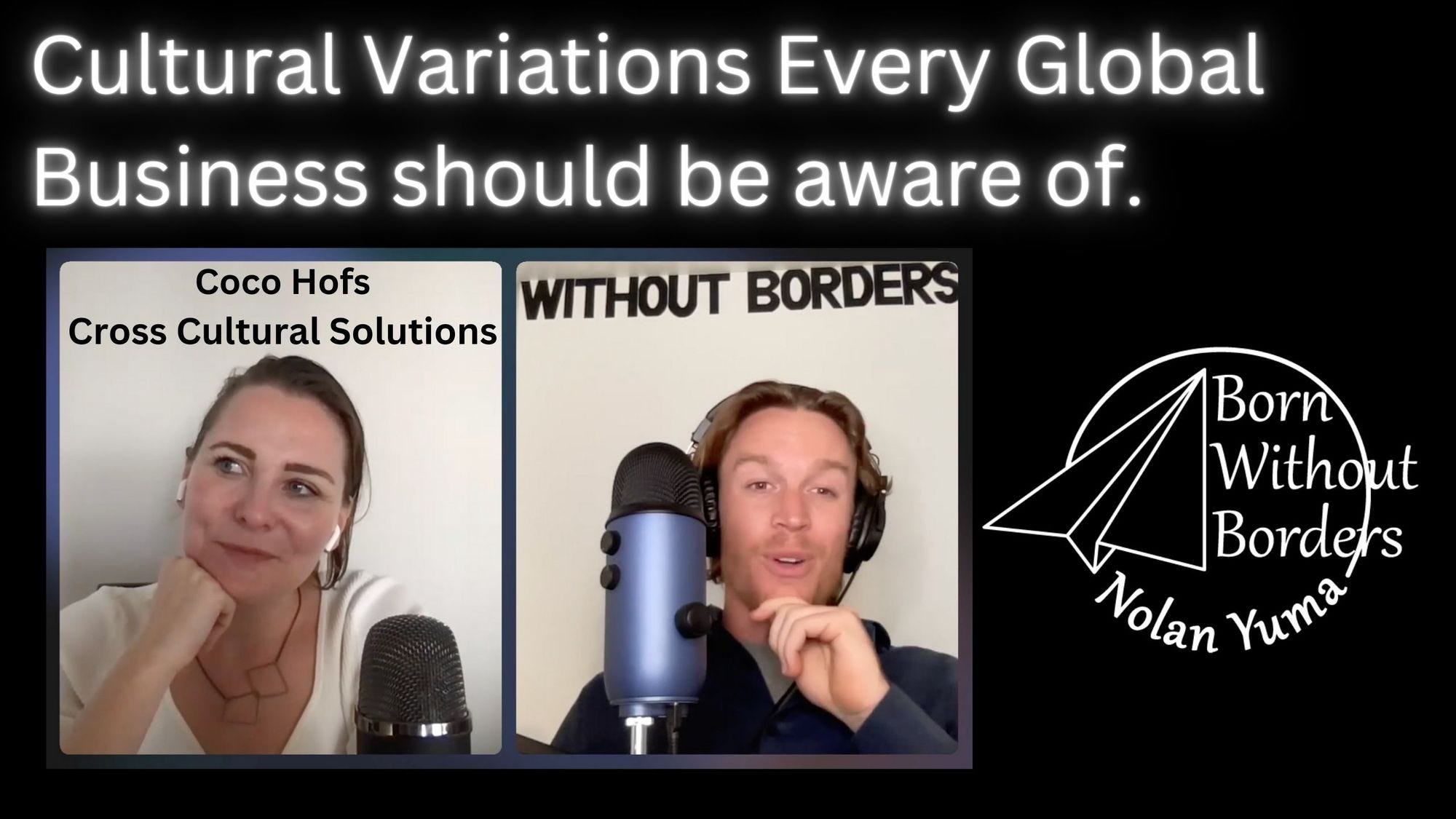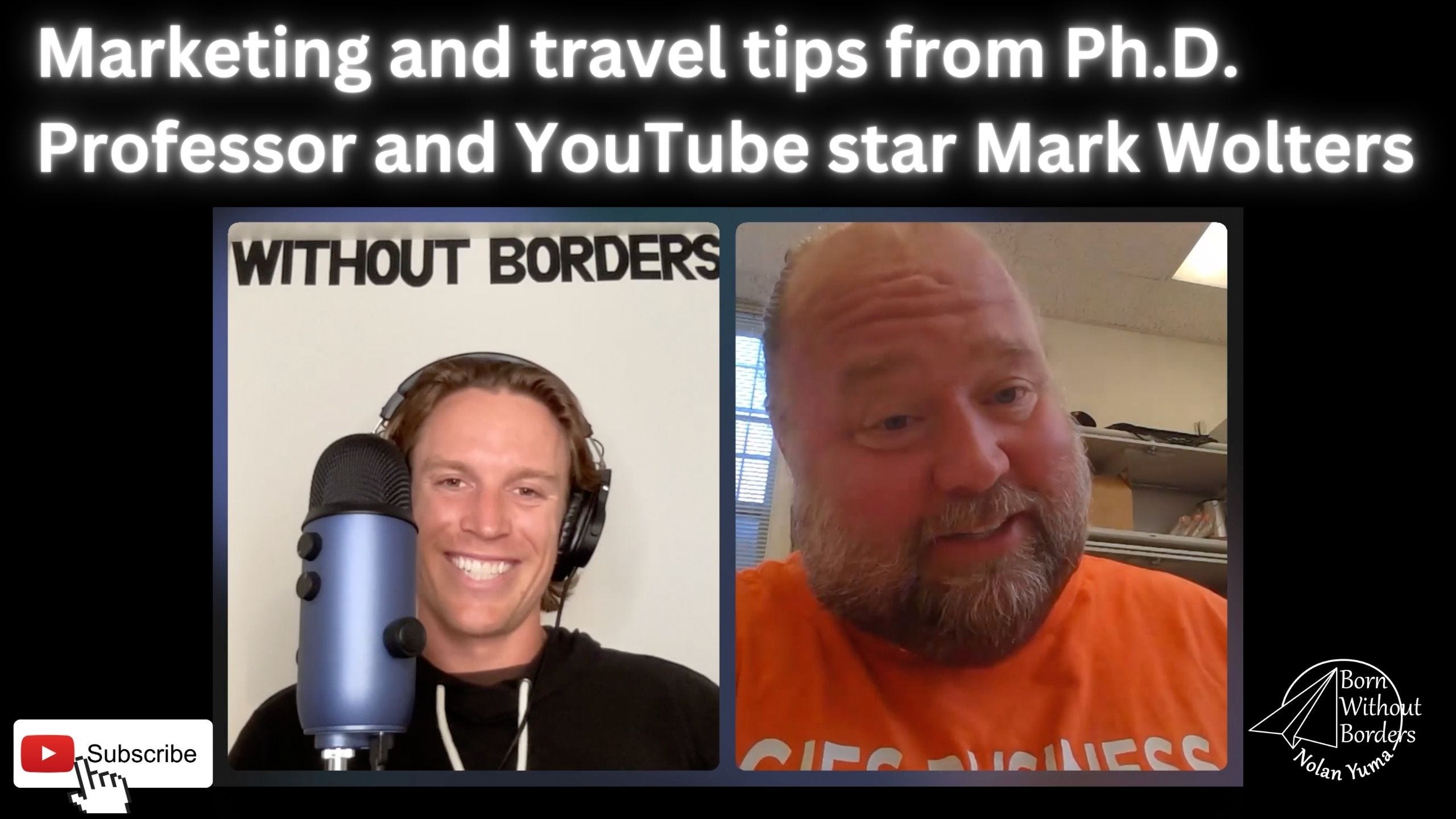Descubrir Without Borders: Stories by the Inescapably Foreign.
Without Borders: Stories by the Inescapably Foreign.

Without Borders: Stories by the Inescapably Foreign.
Autor: Nolan Yuma
Suscrito: 3Reproducido: 29Suscribirte
compartir
© Nolan Yuma
Descripción
The podcast is for nomads, exapts, immigrants, refugees, third-culture kids or anyone else that feels inescapably foreign. Every Tuesday, I share immigration stories, cultural psychology research and try to break down borders.
40 Episodes
Reverse
I’m a planster. If you’re a writer, you’ve probably heard the terms panster, plotter, and planster before. A pantser is someone who “flies by the seat of their pants,” meaning they don’t plan out anything in their story or plan very little. A plotter is someone who plans out their novel before they write it. And a planster is like an agnostic, a wishy-washy mother f****r who dips his toes in where he likes—me. That’s not just how I craft my writing but how I live my life. Aside from my workout routine, my plans are just guidelines. If people, life, the universe (god?), an airline, governments (the Chinese, Canadian, and Spanish ones in my case), o lo que sea throw me a curveball… well, I don’t always get a home run, but I roll with it anyway. Right now, I’m in the planning stage for a 3-4 month journey through Europe to promote the therapeutic effects of slow travel.I’ve almost finished writing my outline with the main reveals and turning points I want to hit, but the characters I meet along the way can still bring my story in a whole new direction. Just like , , , , y El Espejo de mi Alma did to the piece you’re reading right now.Before Mike Sowden recommended Happiness of Pursuit by Chris Guillebeau, I realized I live my life like I craft my writing. This realization came at the same time my sense of home was ripped away, and the cosmic strings of a quest through Europe to the North of Sweden pulled at me like an elastic. If you’ve ever felt a strange sense of sadness or alienation, there’s a potential way out of the confusion—just shift this feeling to a sense of purpose. It’s not all about happiness, although happiness often results from doing something you love. Instead, it’s about challenge and fulfillment, finding the perfect combination of striving and achievement that comes from reaching a big goal. Metaphorically, discontent is the match, and inspiration is the kindling. — El Espejo de mi Alma, the woman I was going to marry this summer, was the match. Within a week, my body and soul knew she was the one. But the one for what? That was for my mind to interpret... or misinterpret. How our wedding plans fell through is a prologue full of love, betrayal, trauma, and surprise flights across the world. However, my quest is not a chronological three-act structure but a fractured narrative with a beginning I’m not ready to reveal. The important part for now is that I realized you can forgive and love those who hurt you when you find growth in the pain. I was denying that growth—those cosmic strings. Then I met Brent and Michael in person, bringing our relationship behind screens into the real world where eyes bonded, glasses clinked, and Valencian diabetes-threatening drinks entered our stomachs—my empty stomach. Just like with their writing, they filled me with advice and wanderlust, but seeing them in person brought back the elastic. Throughout the week, it pulled harder and harder until I discovered a lie that snapped me back to my quest. I revised “Coping With Failure” to include my journey plans across Europe. This was when Mike Sowden recommended Happiness of Pursuit, and became the mentor of this story. Elin Petronella has been coaching me on how to find direction and make my writing business sustainable. Like me and some of you, her birthplace does not define her sense of home. That’s how I knew she saw me. Do you long for something more? Is something blocking you from starting your quest? Can you sense that unhappiness can lead to new beginnings? Then I see you. Like any relationship or good story, my journey can be a mirror to discover something new in yourself. Is it a hero’s journey? Or is it an artsy-slice-of-life-questionable-character-arc journey? I don’t know where I’ll end up, but I do know I’ll share everything I learn and experience along the way. And this, I hope, will help you. Too often, I have seen complacency and comfort cause depression. We must step outside our comfort zone to grow and connect to the greatest truth—change. That growth often starts with acknowledging our dark side instead of hiding from it. It begins with connecting that pain to a greater purpose. That’s why my stories and articles won’t just include travel tips like in “To Bus or Train Through Europe” but expand on travel therapy. I’ve written and interviewed psychologists about culture-bound mental illnesses in the past:I’ll dive deeper into culture-bound mental illnesses over the next few months, but thanks to ’s Happiness of Pursuit and ’s guidance, I know the most significant part of travel therapy is the quest. Every quest requires a sacrifice and goal of some kind. I’ll reveal those in next week’s piece—the last article before I cross the first threshold and leave Castellon, Spain, to make my way through Eastern Europe and to the North of Sweden. Born Without Borders is a reader-supported publication. Paid subscriptions give me the time to research, write, and deliver value to those who feel inexplicably foreign or are searching for ways to step outside their comfort zone. You can also support this trip by doing what I’m doing to afford this trip—Home Exchange.HomeExchange is an online platform that connects people from all over the world to exchange their homes without money (and taxes) changing hands. Plus, there’s a point system, so you don’t need to exchange homes at the same time.If you want to use Home Exchange and support this journey simultaneously, you can use this link.Born Without Borders will never be ridden with affiliates. I’m only including companies that I need for this journey, with or without a referral link.Who is Nolan Yuma?I'm a writer, educator, guiri, actor, older brother, ocean lover, irritable cabron, hot sauce enthusiast, third culture kid fascinated by cultural psychology—but mostly, I'm inescapably foreign. I was born in Santiago de Chile, took my first steps in Antwerp, Belgium, and grew up in British Columbia, Canada. And the moment I felt a deep sense of home in Vancouver, Canada, I ended up in Spain.Want to know more? Get full access to Born Without Borders at bornwithoutborders.substack.com/subscribe
As some of you know, I’m planning a journey through Europe to promote sustainable slow travel and its therapeutic effects. … or maybe I’ll go insane (more insane?) and take a gas-guzzling flight back to Castellon, Spain. No, I won’t. I’m too stubborn for that. Plus, feeling connected to our earth has gotten me through a lot lately. This is a quest to heal, not destroy. Flying unnecessarily would be like blowing cigarette smoke into my yoga instructor’s face. Driving would be blowing vape clouds into her face. Busing would be exhaling morning-after-drinking breath, and using the train would be like a Listerine-scented puff. By the way, if you own some mouthwash company, I’ll gladly replace Listerine with your brand. Affiliates would help with this trip. Don’t like affiliates? Well…Flying is tempting, though. It’s often cheaper than trains in Europe. Especially when you’re like me and fly to the south of Spain in the middle of summer wearing a snowboarding jacket stuffed with socks and underwear so you don’t have to pay Ryan Air’s ridiculous fees for a carry-on bag. I would never affiliate with Ryan Air. Yet, if you mix coaches, trains, Blablacar (a ride-sharing service), and electric moped/Vespa rentals (I found monthly rentals for as low as 114 €/month), semi-sustainable travel can be more affordable than flying. If you’re a European resident, you can get an Interrail pass. If you live outside of Europe, you can get a Eurail pass. However, keep in mind that this is not all you’ll pay. You’ll also need to pay reservation fees up to € 50, although it’s often cheaper and not always necessary. Plus, ferries aren’t included.Here are some ferry prices I looked up for my trip.Tallinn to Stockholm: Starting from 219 € with the 20% from Interrail. Tallinn to Helsinki: 22-44 €Gdnask to Nynashamn: 106 €Gdnask to Karlskrona: 72-92 € It’s also important to note that Interrail and Eurail don’t advertise certain deals in specific countries. For instance, in the past year, I have paid NOTHING for Renfe trains (not including the high-speed ones) in Spain. I pay for an Abono, which costs 10 €, and with that, I get unlimited train rides for four months. Plus, if I use it more than sixteen times, I get the €10 BACK! Knowing all that, I also started looking at Flix Bus, which has connections all over Europe and even shows up on Google Maps when the train options are slower or non-existent. Here are some of the Flix Bus prices I looked up for my trip. Mont Pellier to Venice: 88 € - 160 €Zagreb to Prague: 46 € - 89 € Prague to Krakow: 10 € - 45 € The prices varied quite a bit, just like with trains. If I were to do the opposite of slow travel and hop from destination to destination to take an Instagram pic and do a city instead of experience a city, the continuous Interrail pass would be the best. But that’s not my goal. Although I like to plan as a guideline and make things as inexpensive as possible, the benefits of slow travel come from tapping into the constant flux of the universe. Sure, I’ll have to rush and overnight in a few cities, but the idea is to spend time, work, and live—this isn’t a holiday. It’s about experiencing the people, not checking places off a list. To do that, I need to be open to changing my plans, whether hopping on a train, bus, Blablacar, Vespa, bicycle, horse, donkey, or hitching a ride in what would hopefully be a full car. That’s why I’m a planster, which I’ll explain in my next post.Thank you for being here. Together, we can grow a community for the inescapably foreign. You can also support this trip by doing what I’m doing to afford this trip—Home Exchange. HomeExchange is an online platform that connects people from all over the world to exchange their homes without money (and taxes) changing hands. Plus, there’s a point system, so you don’t need to exchange homes at the same time.If you want to use Home Exchange and support this journey simultaneously, you can use this link. Born Without Borders will never be ridden with affiliates. I’m only including companies that I need for this journey, with or without a referral link. Stick around.What’s your favourite mode of transport?Which countries do you want me to visit?And here’s the big question—Can I stay with you? I bring food, beer, nomadic workout equipment, and love. Get full access to Born Without Borders at bornwithoutborders.substack.com/subscribe
One measure of humanity’s progress is more leisure time. Unfortunately, many use it to consume or ‘be productive’ instead of play. Throughout my adult life, I devoted most of my free time to my creative goals, whether acting, writing, or, dare I say it, ‘creating content.’ The time spent writing what poured out of me, puzzling together plots, filming skits, brainstorming with friends y los voces en mi cabeza, researching what I loved, and networking (the genuine kind) felt like play.The time I spent on social media and doing what I was told sold felt like work. I said to myself if I didn’t put in this work, then doing what I loved would never pay the bills.I goggined my life before David Goggins became a verb. This was a time before bro-science professor Andrew Huberman said doing s**t we don’t like builds the anterior midcingulate cortex for willpower, and Goggins told us that the thing you feel is missing in your life is found “in the suck,” not some “catch-phrase b******t.”True. You find yourself in times of hardship, not comfort. But after twelve years of pushing through “the suck,” the wolves smelled my desperation and capitalized on my passion.Instead of giving up, I decided to go all out with Substack. Rather than spending most of my time on paid work (teaching, personal training, promoting products, and whatever gig economy stint came my way), I treated Substack like a job.I needed to put 40+ hours a week into Born Without Borders, or I’d fire myself (I haven’t quite figured out what that means either.) I churned out two articles a week, read, networked, and implemented all the strategies that seemed authentic to my project.I believed that ‘plan a’ works better when there’s no ‘plan b.’ Now I’m broke and must find stable work. Es lo que hay—this isn't me complaining about working more. Voy a trabajar less.Work has caused me to spend more money than I made, burn out, and limit my growth. Sure, pushing through “the suck” helped me find who I am and what I want. Ironically, that’s a scholar who wants to play.“Scholar” comes from the Latin “schola,” meaning leisure devoted to learning. I fell for the idea that I needed to grind it out so people would pay for what I created.I’ve learned a lot about how to succeed on Substack from by, , by , and of course, , , and , who have gone the extra mile to share what they know with me.I also wouldn’t have made it this far without Switter’s World, Chen Rafaeli, Justin S. Bailey, Harvey Hamer, Mmerikani (Swahili, English), JD Goulet, Paul Moxness, Bowen Dwelle, Kat River, Jonny Bates, Ali Manoogian, Renée Eli, Ph.D, Lloyd Miner, Noha Beshir, Logan Thorneloe, Sam Colt, Michael Edward, Laura Lin, Alex Dobrenko`, Ranjit K Sharma, Junot Díaz, Dean Foster, Lisa Rogers, Danu, M.M. McGuire, James Don BlueWolf, Summer Suleiman, Joseph Lim, Ian Coulls, Expat in Portugal, Lorraine Tilbury, Samuel Lopez-Barrantes, neena maiya, M. E. Rothwell, Nishant Jain, Andy Adams, Priya Iyer, Samantha Childress, Alexander M Crow, Amrita Roy, , Alison Acheson, Monica Nastase, Ann Wolter, Bruce Joffe, Sam Briggs from , Michie O'Day, Kimberly Anne, ,Louise Haynes, Aimee Liu, Frank Janssens, family members who prefer to remain nameless, and all of you who subscribe to my newsletter.But right now, I’m lost.I started for nomads, immigrants, third-culture kids, and everyone else who feels inescapably foreign. Es para todos quien quieren salir de las fronteras que impone su mente. Like my art, my life is a constant journey where I say yes to everything and then roll with the punches. But after twelve years of failure, the vision that my unrealistic narrative will one day materialize is starting to dwindle.When I started the Forever Foreign series, crafting my parents’ life stories into the written word felt like my last resort—the book that would finally propel my career.My parents got married after six dates, wandered amid CIA shadows and sticky red tape, celebrated with the Sandanistas, dwelled on a monkey-ridden island with a beat-loving recluse, rose to the top of Tenerife’s tourist sector, dodged the draft, smuggled—The adventures were endless, but it took cancer for my father to commit to the stories I’ve begged him to pen throughout my life. The time we spent talking and writing while an ocean apart meant more than any career or financial-related goal I had, but the lack of success took its toll on us.Sometimes, trying to capitalize on stories kills their soul.My next post, “Sperm on the Rocks,” will be the final chapter, so those who have followed the stories from the beginning will experience the cyclical narrative I planned. Initially, this story was supposed to come in three months (and three countries) later, but pushing through was destroying what I love.Maybe I’ll return to my parents' stories but through my voice and experience. In a time of AI, I believe art must be more personal than ever. ChatGPT can imitate and edit my words but can’t play with my imperfections and contradictions as you and I can.I will keep writing from this sense of play because it’s the only way I know to live with meaning in this world. But until becomes more sustainable, I can’t guarantee two articles a week anymore. If you want to support this, paid subscriptions give me the time to write my best words. They allow me to write outside our borders.I’ve created a few polls to help me find direction, but art can’t always be categorized into a few questions, so please let me know what you think in the comments.I appreciate todo tu ayuda.Here’s the big question.Are you interested in reading about a cross-continent (Europe) fitness challenge trip that supports sustainable slow travel and a more borderless world?In the past months, I’ve put my job and writing aside to support the person I thought I’d marry. Turns out, I was cheated on and manipulated throughout the relationship. Was it trauma, mental health, pure selfishness, our culture’s push for individualism, religious background, influencer love gurus, or a combination of them all?Why did I forgive so much? How come I couldn’t set boundaries? Why am I still madly in love? Am I a masochist? Did I enmesh the relationship? I will investigate and process this by interviewing people I meet along the way.The only way to keep hate out of my heart is to turn the pain into something creative I can grow from and help others with.I’m now selling most of my belongings and renting out my apartment so I can heal through travel, writing, and the only measure I’ve ever had control over, fitness.I guess I haven’t let go of goggining my life.So, I plan to either a.) hike and transit from Spain to Sweden while completing various fitness challenges and interviewing people about mental health or b.) Bike from Spain to Sweden while completing various fitness challenges and interviewing people about mental health.The style, structure, and content of my writing will largely depend on how you answered the other questions.Most importantly, let’s collaborate!Now that I’m not tied down to a schedule, I have time for many more collaborations. So please reach out to me if you want to write, podcast, film, act and create together. Get full access to Born Without Borders at bornwithoutborders.substack.com/subscribe
Why live without borders?For this episode, the season one finale, that’s what I’m exploring. If this is your first time tuning into the show, my name is Nolan Yuma Janssens. I was born in Chile, took my first steps in Belgium, and the second I felt a deep sense of home in Canada, I ended up in Spain. I aminescapably foreign. Over the past eight months, I have interviewed people from all over the world. People with clashing ideologies that have resulted in culture wars and actual wars. Christians, Muslims, capitalists, communists, gays, straights, beliebers, receivers, anarchists, and masochists. Black, brown, yellow, white.Labels. Whereas they help us categorise and describe, all they really do is conquer and divide. Like ecosystems, the more diverse our society and people, the more resistant we are to disease and whatever the universe throws at us… except maybe bureaucracy: where the simple becomes complicated and where common sense goes to die… slowly.Anyway. Unity, not uniformity. Some of my guests had very different opinions and ideas than my own. Some don’t support gay marriage, think communism works, like guns, and some don’t even like beer. How the hell did I get along with these people?I focused on what makes us human. Curiosity. And travel is curiosity manifested through movement. Our bipedalism, large brains, dextrous hands, and speech help to explain our ability to travel to more places than any other animal on earth. We are designed to be curious travellers. It all started with our ability to stand up straight, scan the horizons, and seek more food, shelter, people, and information.By focusing on what unifies us — curiosity, travel, and our love of culture — I learned something from every one of my guests. I listened. But listening does nothing without reflection, just like travel does nothing without stillness. And a bureaucrat does nothing… does nothing. So why live a life without borders? I started this podcast hoping to break down borders. Not all borders. I know they play a role in preserving linguistic heritage, culture, and providing jobs for people who work from 9 to 5, but get home by 2. I think you know who I’m referring to by now. Anyway. What I mean by a world without borders is a world without the walls of anger, hatred, and ignorance that separates us. That’s what I mean by “Without Borders.” At first, I thought that meant being a “global citizen” because problems like climate change, poverty, inequality, famine, war, and the popularity of Reggaeton are global problems that take a global mindset to solve.But upon further reflection, I realised the term “global citizen” has become an ideology in itself. Many who — and here comes that ugly word — ‘label’ themselves as global citizens believe their way of thinking is good for others, and as Alan Watts pointed out, believing you’re doing good for others is full of conceit.A world full of virtuous global citizens running around?That doesn’t sound diverse. That sounds like uniformity, not unity. It sounds like the road to hell paved with good intentions. So I’m not trying to galvanise a movement of travellers or “Global Citizens.” I’m just trying to be part of a balance of stories. Stories that don’t push one ideology over another. Stories that show we’re a diverse species of primates just trying to figure ourselves out. As I mentioned at the beginning, this is the season one finale, but it might be the end of the Without Borders podcast. If you enjoyed this podcast, please share your favourite episodes and spread the word. I’m here to listen to your feedback, collaborate, and support projects, but I can’t sustain the hours I put into creating and marketing this podcast if people don’t support the show at bornwithoutborders.substack.com.I do this because I know we need a balance of stories. I believe that when diverse voices reach a broader public, we can begin to increase rational compassion. Thanks to everyone who came on the show and took the time out of their day to listen. And if you happen to be a bureaucrat. I’m sorry for all the jokes and I hope you enjoyed listening to this during your work hours. Get full access to Born Without Borders at bornwithoutborders.substack.com/subscribe
Nolan speaks with Chantal Patton from @GrowingUpWithoutBorders Chantal reveals what it’s like trying to travel to every country in the world while homeschooling three kids. Nolan and Chantal also discuss school systems around the world, cultural variations, why Home Exchange kicks ass, and of course, why both their projects have the words “Without Borders.” Support the show Growing Up Without Borders Website and CoursesTranscript available for English learners. 00:00 Introduction 01:33 - Visiting every country with 3 kids 09:31 - Generalising vs learning about cultures 20:28 - Homeschooling & School systems around the world 38:39 - Cultural variations within Canada, the USA, and New Zealand 41:22 - Airbnb & hotels vs Home Exchange 47:04 - Growing Up Without Borders Courses & digital nomad tips 53:49 - Why “Without Borders?” 56:18 - Check your “Geographical privilege.” Get full access to Born Without Borders at bornwithoutborders.substack.com/subscribe
In this episode, we explore the role of educators in a world with artificial intelligence. Discover how teachers adapt and navigate an AI revolution. Katie and Nolan also share tips about how to learn languages and adapt motivation techniques depending on the culture and learning style. Watch the video here. Support the show, read the transcript, and learn more at:You can also learn more about Abridge Academy. 00:00 - Learning Chinese & Acculturating to China 17:23 - A reacher’s role in a world of AI 25:00 - Culture-bound motivation styles 33:45 - Acculturating to Japan 40:15 - How language shapes our perception
Get full access to Born Without Borders at bornwithoutborders.substack.com/subscribe
Nolan speaks with Paul Dermody, an online personal trainer, podcaster, and part-time professional writer passionate about travel and languages. Paul shares his tips on achieving your fitness and health goals with a holistic approach that can apply to all aspects of life. You can check out the specific topics below and select which segment of the podcast you want to listen to. Want Paul as a personal trainer or to get more health tips and motivation?WebsiteInstagram Support the show Watch the episode on YouTube.00:00 - Intro 01:56 - Why Paul Dermody chose to make Spain home. 05:30 - How travel affects your identity 11:51 - The problem with travel (and life) no one talks about 16:45 - Benefits of travel 20:19 - How culture affects health, diets, and fitness 24:38 - How to change your mindset for better health 33:19 - Culture-bound eating disorders 40:49 - Diet culture & woke culture 51:25 - Paul’s personal training
Get full access to Born Without Borders at bornwithoutborders.substack.com/subscribe
Nolan Yuma speaks with Dr. Benjamin Cheung, a leading expert in the fields of genetic essentialism, culture and sleep, and acculturation. Benjamin shares his cultural experience as a 1.5 generation Chinese Canadian and how parents of immigrant children can ease the acculturation process. Nolan and Ben also talk about how culture affects the outcomes of drug use, psychedelics, the 4-hour work week, and even how much sleep you need. You can also watch the video recording on YouTube. Learn more about Dr. Benjamin Cheung research at UBC.Episode Transcript 00:00 Intro 01:34 - Generation 1.5 & Third culture kid experiences & parenting advice 17:35 - Cultural adjustment and acculturation strategies 18:37 - Identify & the authentic self 22:14 - Ego death & psychedelics 26:13 - Microdosing, drugs, and how culture & criminalisation affect their positive outcomes 33:24 - Genetic essentialism & how society influences depression 42:03 - How culture influences the 4-hour work week 44:33 - How culture influences how much sleep you need 58: 11 - Conclusion Get full access to Born Without Borders at bornwithoutborders.substack.com/subscribe
Also available on YouTube.Nolan speaks with César, @SpanishLanguageCoach , about his immigration and acculturation experiences. They discuss the cultural characteristics of England and Spain with a focus on the differences in how people approach political correctness and cancel culture. They also share language learning tips and how the recent social media trends have affected language learning content. Support the showLinks to César's course and podcast spanishlanguagecoach.comPodcast00:00 - Intro 01:50 - César’s acculturation story (Comparing Spain to England)07:16 - The Petardos (Firecrackers) & Fallas tradition and its consequences 12:19 - Objectivity, identify politics, and César’s Spanish learning podcast objectives. 17:21 - Political correctness in Spanish vs England 33:57 - Language learning tips 45:08 - Social media trends & how it affects language learning 52:23 - Switching to Substack Get full access to Born Without Borders at bornwithoutborders.substack.com/subscribe
Nolan speaks with Daniel Thompson, the CEO of Noma Collective, a business and community that specializes in creating experiences for remote workers. They discuss cultural and individual differences in time perception, life in Merida, negotiation styles, home births, becoming a digital nomad that helps the local culture rather than destroying it, and slowing the hell down. Support the showJoin a Noma Experience Noma Experience Instagram 0:00 - Intro01:41 - Growing up in the UK, New Zealand, and the USA05:43 - A nomadic home birth 08:18 - Life in Merida 12:41 - Living a nomadic life with Noma Collective 20:27 - Perception of time, both in cultures and individuals 28:30 - Task-based vs relationship-based cultures. 31:17 - Music industry & rave culture 35:09 - How to become a digital nomad (even with a family)42:24 - Noma’s social impact & slow travel 52:00 - Slow travel & returning to the human pace Get full access to Born Without Borders at bornwithoutborders.substack.com/subscribe
Coco Hofs uses her business experience and cultural consulting expertise to discuss Erin Meyer's 8 Scales from The Culture Map with Nolan Yuma. They analyze and critique the research from Edward Hall, Geert Hofstede, and Richard E. Nisbett while bringing in some of their personal experiences and stories –– In Nolan's case, that includes why getting drunk can create stronger bonds, which in some cases, relates to what the Japanese call Nomikai 飲み会. Support the showNeed cultural consulting for your business?Website: www.cocohofs.comInstagram: https://www.instagram.com/crossculturalsolutions_by_coco/LinkedIn: https://www.linkedin.com/in/coco-hofs/Coco is of Dutch origin and has lived outside The Netherlands since 2016.She lives in Peru and runs her own business, 'Cross-cultural Solutions'. With Cross-Cultural Solutions, she helps organizations overcome cultural differences in the international workplace. She helps professionals operating in a global economy understand the impact that our cultural background has when doing business internationally and across cultures.In her opinion, organizations tend to forget that cultural differences have a significant impact on how smoothly the business goes and how well teams of different cultural backgrounds work together.She is a cross-cultural trainer, executive coach, and keynote speaker who works with companies from all over the world.English learners can access transcripts of all the episodes.00:00 - Introduction & Coco Huff's experience that led to cultural consulting05:04 - Dutch negative feedback & Critique on Erin Meyer's The Culture Map12:49 - Communication style (high-context to low-context scale)13:47 - Evaluation (direct to indirect negative feedback scale)14:50 - Leading styles (egalitarian to hierarchical scale)15:11 - Deciding (Consensual to top-down scale)19:17 - Trusting (Task-based to relationship-based scale) & possible anecdotal mistakes27:56 - Nomunication (Nomikai 飲み会)/drinking to build trust31:16 - Disagreeing (Confrontational to avoid confrontation scale)34:38 - Scheduling (Linear time to flexible time scale)41:08 - Persuading (Application-first to principle first/deductive reasoning to inductive reasoning)48:08 - Relating Hofstede's indulgence scale to incremental or entity theory52:52 - Persuasion difference between analytic and holistic thinkers56: 14 - Coco's immigration story & Conclusion Get full access to Born Without Borders at bornwithoutborders.substack.com/subscribe
@ProfessorWolters from @woltersworld shares his experience and knowledge as a marketing professor and travel enthusiast who obtained YouTube fame. Professor Wolters could quit his job, but he loves teaching and "also loves insurance." His passion and humour come through when he gives Nolan and the listeners advice on becoming successful YouTubers and online creators. Nolan and Professor Wolters also discuss food culture, distance culture, and their thoughts on "America has no culture." Transcript for English learnersSupport the showLearn more about Professor Mark Wolters:Wolter's World Website Wolter’s World Youtube Channel All episodes are available on my YouTube Channel.00:00 - Intro (Mark Wolter & his work) 06:09 - Sobre mesa and service culture around the world 10:22 - Response to "America has no culture." 16:26 - Distance culture 20:55 - Canadian vs American culture 26:50 - How to approach confrontation and discussion around the world 30:01 - Professor Wolter's business channel & marketing advice 36:46 - Becoming successful on YouTube & social media 54:00 - The do's and don'ts of travel Get full access to Born Without Borders at bornwithoutborders.substack.com/subscribe
"Developing nation? Bro. Let's get to the point. We're a poor country," says Aeron.In this conversation, Aeron DEllosa from @animmigrantslifepodcast and Nolan Yuma don't hide the truth with political correctness. Instead, they get right to the point when discussing immigrating to Canada, Filipino culture and psychology, Tagalog, decolonization, and racism. Without Borders is a free podcast. If you enjoy this podcast and want to access the transcript, please consider becoming a paid subscriber at withoutborders.fyi. Your support makes the project possible. You can also find my travel series on Youtube.00:00 - Intro01:46 - Montreal vs Vancouver06:07 - Becoming Canadian and staying Filipino. Individualism vs Collectivism11:09 - Utang na loob & Corruption16:19 - Pakikisama & Hiya & cultural differences in confrontation styles in Canada, the Netherlands, and the Philippines26:12 - Political correctness isn't helping marginalized people33:54 - Acculturating to Canada & types of racism 41:38 - Is the Philippines a matriarchal society?52:47 - Decolonisation in Filipino culture58:41 - How dangerous social media is for understanding culture1:02:03 - Wrap up Get full access to Born Without Borders at bornwithoutborders.substack.com/subscribe
Two close friends from different backgrounds discuss PC language, racism, growing up in a small town, returning to the Muslim faith, spirituality, and marriage. Without Borders is a free podcast. If you enjoy this podcast and want to access the transcript, please consider becoming a paid subscriber at withoutborders.fyi. Your support makes the project possible. You can also find my travel series on Youtube.00:00 Intro02:30 - Brown versus white parenting & family dynamics & hierarchies. 13:27 - Testosterone, weight lifting and martial arts.17:49 - PC Language & Curry Hill 23:36 - Growing up Muslim around Sikh people & Ramadan 29:43 - Culture & Mental Illness 34:21 - Returning to the Muslim faith & spirituality & Lying 47:54 - Arranged vs Love Marriages Get full access to Born Without Borders at bornwithoutborders.substack.com/subscribe
Vida shares the differences between living as an asylum-seeker and a refugee in Belgium. She also talks about becoming Bahai, the Green movement (Persian Spring), and how everything she experienced led to self-actualization. Nolan reveals that Maslow saw self-transcendence as the top of the pyramid, not self-actualization. Without Borders is a free podcast. If you enjoy this podcast, please consider becoming a paid subscriber at withoutborders.fyi. Your support makes the project possible. You can also find my travel series on Youtube.00:00 - Introduction 00:42 - Life as refugee vs asylum seeker 13:09 - Bahai religion & beliefs 22:03 - The Green Movement (Persian Spring) & Revolution 27:58 - Self-actualisation & self-transcendence Get full access to Born Without Borders at bornwithoutborders.substack.com/subscribe
Nolan Yuma and Vida Razavi talk about life in Iran, Eastern Africa, volunteering (and all the corruption involved), intersectionality, growing up in a hierarchical society, how to adjust to high-power and low-power distance cultures, and immigration.Vida Razavi has lived in 6 different countries and three continents as a refugee, student, volunteer, freelancer, and researcher. Vida studied physics as her undergrad and has master's degrees in sociology and developmental studies. Her passion for social justice and participatory democracy led to various career moves and eventually brought Vida to her current work in an umbrella organization for gender equality.Without Borders is a free podcast. If you enjoy this podcast, please consider becoming a paid subscriber at withoutborders.fyi. Your support makes the project possible. You can also find my travel series on Youtube.00:00 - Introduction03:20 - Life in Mashhad, Iran08:40 - Albert Schweitzer influence & Moving to Africa18:38 - White & “yellow” privilege in Africa24:16 - Growing up in a hierarchical society * Low and high power distances34:50 - Gender roles in Eastern Africa & Intersectionality38:48 - High-context vs. low-context cultures & Theory-first vs. principal-first cultures.43:18 - ICT4D, Elon Musk’s Starlink, Mark Zuckerberg Free Internet47:36 - Charities, the development sector, and their corruption51:32 - Vida’s experience with immigration bureaucracy Get full access to Born Without Borders at bornwithoutborders.substack.com/subscribe
"You have to give them the opportunity to express themselves," says Michael Brein, and that's what I hope to have accomplished in this interview. Michael Brein is referring to his interviews with people who have experienced the paranormal. Michael discusses his books and opinions about travel as Nolan asks questions about cultural competence, how religion affects psychology, and what Michael's experience with the Peace Corps was like. This is a great conversation for intermediate English learners as we speak much slower than usual. The transcript is available on www.withoutborders.fyi/michael-bren-the-travel-psychologist-and-ufologist. Without Borders is a free podcast. If you enjoy this podcast, please consider becoming a paid subscriber at withoutborders.fyi. Your support makes the project possible. You can also find my travel series on Youtube.00:00 Intro 02:20 What is travel psychology? 05:18 - Experience with the Peace Corps & learning languages 10:19 - Culture shock 16:11 - Intercultural Communication and the Adjustment of a Sojourner. 31:13 - Culture and psychology of religion. 34:41 - Intercultural competence. 40:30 - Idiots Abroad 46:46 - Road to the strange, UFOs & paradigm shifts Get full access to Born Without Borders at bornwithoutborders.substack.com/subscribe
This is not an episode from the WithoutBorders podcast. I was interviewed by Linus Lu at Interintellect to talk about The Without Borders Salon Series. I would love for you to join the monthly discussion.After living in Chile, Belgium, Canada, and now Spain, Nolan spends his days studying cultural psychology, interviewing people from around the world, traveling, and writing stories to break down borders. His project, Without Borders, is a collective of new articles, stories, videos, and podcasts each week, bringing insight and perspective to these experiences.This series is for nomads, expats, third-culture kids, immigrants, or anyone who feels inescapably foreign. In this space hosted by Nolan Yuma Janssens every Sunday at 18:00 CET, we will discuss ways to break down borders through cultural psychology research, immigration advice, and travel stories. After hosting the Without Borders miniseries in February, Nolan realized the discussions can’t be contained in one series and needed to be ongoing. He is constantly updating the material to build upon each previous salon.The themes of the monthly discussion revolve around: Abating polarization Advancing the bureaucratic system and immigration process Exploring universal truths about morality Improving cultural competence Increasing productivity for international organizations Limiting xenophobia Storytelling techniques for “The Inescapably Foreign.”Every Sunday at 18:00 CETNote: You can purchase each salon ticket for $15 or a series ticket for $90 (save 50%), valid throughout 2023. Get full access to Born Without Borders at bornwithoutborders.substack.com/subscribe
Nolan Yuma and Tola Alade, the CEO of Marmalade venture, talk about the misconceptions people have about Africa and how Marmalade fixes them through branding and raising awareness about African entrepreneurs and artists.Nolan and Tola share their opinions about critical theory, Jordan Peterson, the rhetoric around slavery, and how to unify instead of divide. Subscribe and support Marmalade: https://www.marmaladecollective.com/Without Borders is a free podcast. If you enjoy this podcast, please consider becoming a paid subscriber at withoutborders.fyi. Your support makes the project possible. You can also find my travel series on Youtube.00:00 - Introduction03:33 - Fixing misconceptions about Lagos, Nigeria & Africa08:39 - Marmalade Collective & Africa's most valuable asset — Culture16:49 - LGBTQ rights in Africa concerning branding21:10 - Using Jordan Peterson, Nathan Nunn, and Magatte Wade to talk about African Economy.25:04 - Slavery, Individualism, entrepreneurialism, and moving forward.31:11 - Critical theory and intersectionality does not unify. 39:10 - Racism in North America vs. Africa49:40 - Breaking African Stereotypes & Discussing Stereotype threats.56:29 - Wrapping it all up. Get full access to Born Without Borders at bornwithoutborders.substack.com/subscribe
As a child born in Italy during World War I, Dr. Salvatore Forcina's early years were spent poverty-stricken and without proper shelter. Like many Italians at the time, his parents followed a migration to Argentina. Shortly after arriving in Argentina, he was indoctrinated and abused in a Catholic boarding school for seven years, as they offered the only available avenue for "educating" the boy. His indefatigable determination eventually compelled him to enter and graduate from medical school, emigrate to America and become the chief of surgery at two major hospitals. Preorder Dr. Forcina's book: https://www.barnesandnoble.com/w/the-american-doctor-salvatore-j-forcina/1141643151 Follow Dr. Forcina on Instagram: https://www.instagram.com/drsalvatoreforcinamd/ Without Borders is a free podcast. If you enjoy this podcast, please consider becoming a paid subscriber at withoutborders.fyi. Your support makes the project possible. You can also find my travel series on Youtube.00:00 - Intro with The American Doctor 01:48 - Life in Italy during WW2 03:54 - Immigrating to Argentina 10:35 - Catholic boarding school in Argentina 21:35 - Role models, importance of family, and studying medicine 29:24 - Acculturating to Argentina and the United States as an Italian 33:40 - How to overcome adversity & Victor Frankl’s Man’s Pursuit of Meaning. 49:30 - Opinions about American healthcare. 01:00:07 - The importance of immigrants. Get full access to Born Without Borders at bornwithoutborders.substack.com/subscribe






